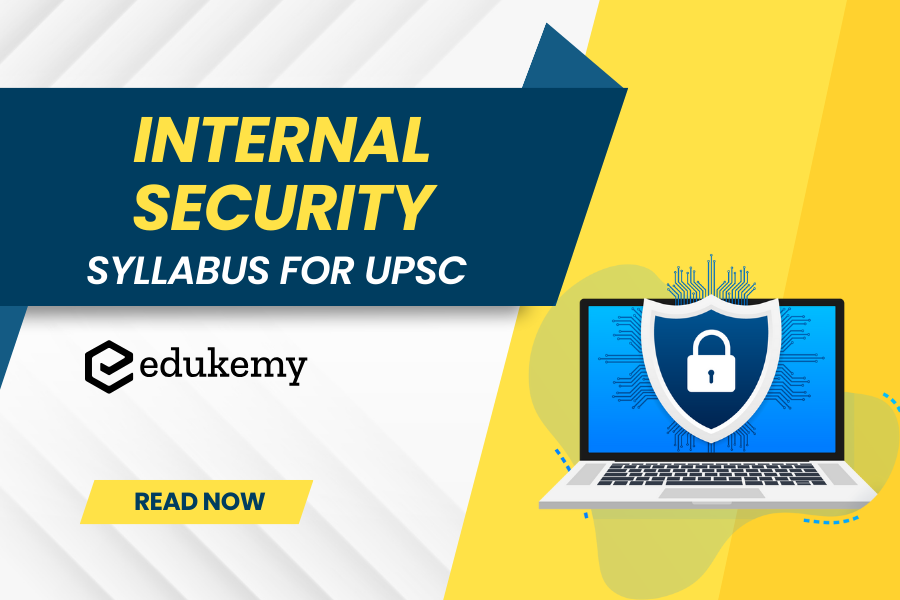
The Internal Security Syllabus for the Union Public Service Commission (UPSC) examinations is a crucial component that assesses candidates’ understanding of various aspects related to the maintenance of internal security within the country. The syllabus is designed to evaluate candidates’ knowledge of challenges and threats to internal security, governance issues, and the role of various security forces and agencies in addressing these concerns. It encompasses a comprehensive study of topics such as terrorism, insurgency, border management, cyber security, and disaster management, offering a holistic perspective on safeguarding the nation’s internal stability. Aspirants are expected to delve into the intricacies of policy formulations, security strategies, and the coordination mechanisms essential for effective internal security management. The Internal Security Syllabus not only equips candidates with a deep understanding of the contemporary security landscape but also tests their analytical and problem-solving abilities in the context of national security.
Contents
- 1 Internal Security – Topics and Sub-Topics
- 2 FAQs for Internal Security Syllabus for UPSC
- 2.1 Question: What is the significance of internal security in the context of UPSC examination?
- 2.2 Question: What are the major threats to internal security that UPSC candidates need to be aware of?
- 2.3 Question: How does the internal security syllabus relate to the broader framework of national security?
- 2.4 Question: Discuss the role of intelligence agencies in ensuring internal security.
- 2.5 Question: How does the government address issues of insurgency and communalism in the internal security framework?
- 3 In case you still have your doubts, contact us on 9811333901.
Internal Security – Topics and Sub-Topics
Internal security is a broad and complex field that encompasses various topics and sub-topics related to the protection of a nation’s internal order, citizens, and institutions. Here is an overview of key topics and their sub-topics within the realm of internal security:
- Counterterrorism:
- Counterterrorism Strategies
- Intelligence Gathering and Analysis
- Counterinsurgency Operations
- Cyberterrorism
- Law Enforcement:
- Police Reforms
- Community Policing
- Use of Technology in Policing
- Specialized Units (SWAT, Anti-Terrorism Units)
- Border Security:
- Border Surveillance
- Immigration Control
- Smuggling and Trafficking
- Cross-Border Cooperation
- Cybersecurity:
- Critical Infrastructure Protection
- Cybercrime Investigations
- National Cybersecurity Policies
- Cyber Threat Intelligence
- Emergency Management:
- Disaster Preparedness
- Crisis Response and Recovery
- Pandemic Preparedness
- Civil Defense
- Intelligence and Surveillance:
- Signals Intelligence (SIGINT)
- Human Intelligence (HUMINT)
- Surveillance Technologies
- National Security Agency (NSA)
- Political Stability:
- Countering Political Extremism
- Election Security
- Internal Political Threats
- Political Intelligence
- Public Safety:
- Emergency Services (Fire, Medical)
- Public Health Security
- Safety Regulations and Compliance
- Transportation Security
- Legal Frameworks:
- National Security Laws
- Anti-Terrorism Legislation
- Privacy Laws
- Surveillance Laws
- Social Cohesion and Countering Radicalization:
- Community Engagement
- Countering Violent Extremism (CVE)
- De-radicalization Programs
- Media and Propaganda Analysis
- Financial Security:
- Anti-Money Laundering (AML)
- Counter-Financing of Terrorism (CFT)
- Economic Espionage
- Asset Forfeiture
- Critical Infrastructure Protection:
- Energy Security
- Transportation Security
- Water and Food Security
- Telecommunications Security
- Technology and Innovation:
- Surveillance Technologies
- Artificial Intelligence in Security
- Biometric Systems
- Robotics in Security Operations
- International Cooperation:
- Diplomacy in Security Affairs
- Intelligence Sharing
- Joint Task Forces
- Regional Security Alliances
FAQs for Internal Security Syllabus for UPSC
Question: What is the significance of internal security in the context of UPSC examination?
Answer: Internal security is a crucial aspect of the UPSC syllabus as it deals with the protection of a nation’s internal order and stability. It includes topics such as terrorism, insurgency, border management, and the role of various security forces. A solid understanding of internal security is essential for aspirants to comprehend the challenges faced by the country and formulate effective strategies to address them.
Question: What are the major threats to internal security that UPSC candidates need to be aware of?
Answer: UPSC candidates should be well-versed in various threats to internal security, including terrorism, insurgency, cyber threats, communalism, and extremism. Understanding the root causes, historical context, and contemporary manifestations of these threats is essential for aspirants to analyze and propose effective solutions.
Question: How does the internal security syllabus relate to the broader framework of national security?
Answer: Internal security is an integral component of national security. While national security encompasses protection against external threats, internal security focuses on maintaining peace and order within the country. UPSC candidates need to comprehend the interconnectedness of these two dimensions and the role of diplomatic, economic, and military measures in safeguarding the overall security of the nation.
Question: Discuss the role of intelligence agencies in ensuring internal security.
Answer: Intelligence agencies play a crucial role in gathering, analyzing, and disseminating information related to internal security threats. UPSC aspirants should be familiar with the functioning of agencies like RAW (Research and Analysis Wing), IB (Intelligence Bureau), and NIA (National Investigation Agency). Knowledge of intelligence gathering methods, counterintelligence, and the importance of coordination between different agencies is essential.
Question: How does the government address issues of insurgency and communalism in the internal security framework?
Answer: UPSC candidates should understand the government’s approach to tackling insurgency and communalism, including the use of security forces, socio-economic development, and political initiatives. Knowledge of laws like AFSPA (Armed Forces Special Powers Act) and strategies such as counterinsurgency operations is vital. Additionally, an understanding of community policing and conflict resolution mechanisms is essential in addressing communal tensions.
In case you still have your doubts, contact us on 9811333901.
For UPSC Prelims Resources, Click here
For Daily Updates and Study Material:
Join our Telegram Channel – Edukemy for IAS
- 1. Learn through Videos – here
- 2. Be Exam Ready by Practicing Daily MCQs – here
- 3. Daily Newsletter – Get all your Current Affairs Covered – here
- 4. Mains Answer Writing Practice – here

